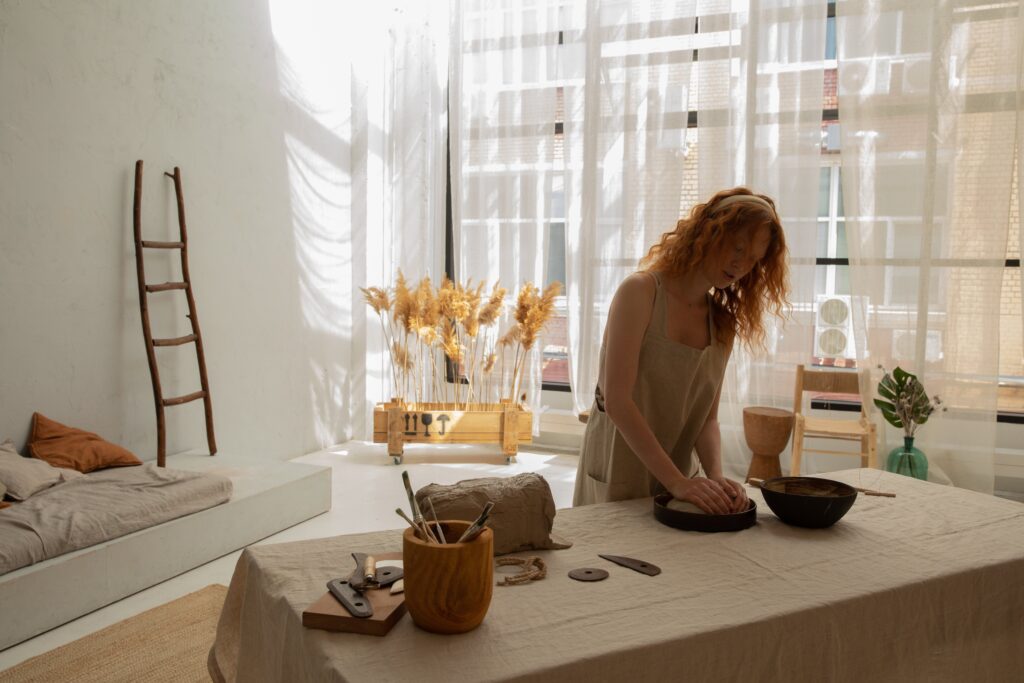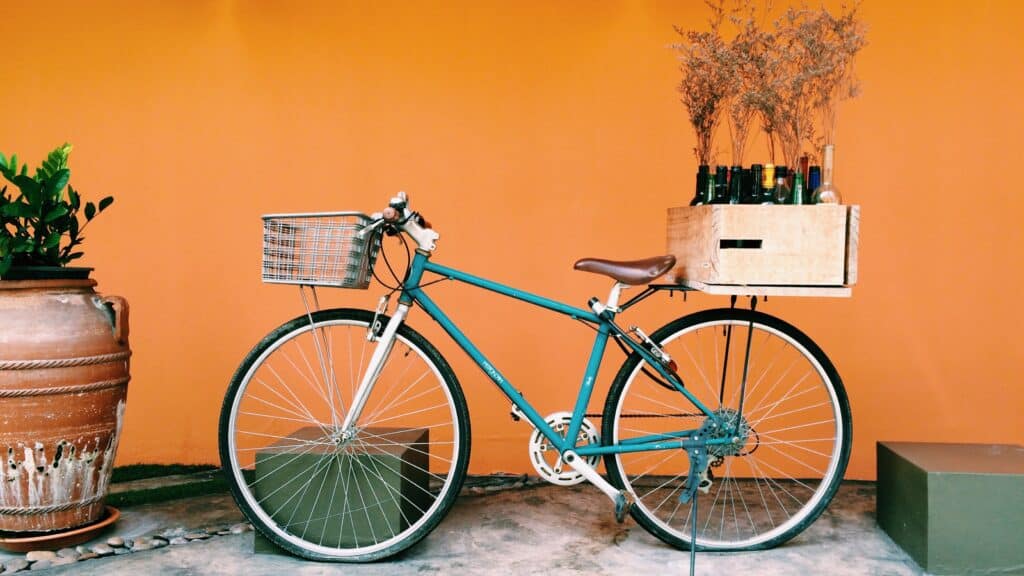Living a simple life in a modern world is more appealing as I grow older.
I’m a 90s kid. This should clear up a lot.
I grew up during a time when social media didn’t exist and we were tipping into the era of cordless phones and dial-up internet that wasn’t worth the hassle or the time.
As a teen, I’d never imagine that I’d be hoping for the downfall of smartphones and technology as an adult.
I often reminisce about the times where there was more human interaction, and things weren’t as accessible in our homes or at the palms of our hands.
What if apps, smart TVs, smartphones, and digital currency ceased to exist?
Would the world be better off?
With the way technology is taking every industry by storm, it’s something we may never know.
We definitely aren’t going backwards, and anything that existed before Y2K seems like light years away.
So, how do people who want to live a slower, simpler lifestyle adjust to living in a fast-paced modern world?
To answer that, we first need to explore what living simply means.
What is simple living?
Living a simple lifestyle involves consciously opting for a minimalist approach and prioritizing meaningful experiences and relationships over material possessions.
Living simply is about finding contentment in the essentials, decluttering the non-essential, and embracing a well balanced, purpose-filled life.
Someone who practices simple living hyper focuses on core values, fostering authentic relationships, and deviates from materialistic gain and hectic lifestyles.
Simple living involves practices such as decluttering, minimalism, mindful consumption, intentional goal setting, and indulging invaluable experiences.
You can simplify every aspect of your life, including your home, work environment, relationships, and daily routines.
There are several benefits that accompany a simpler lifestyle, such as reduced stress, an abundant mindset, a sense of contentment, and a sustainable and purposeful existence.
How can I live a simple life in today’s world?
Adopting a simple lifestyle isn’t hard to do. There are many ways to live simply each day.
Take a minute to reflect on your daily routine. How simple or hectic is your day?
We all have different roles and responsibilities, but there are different ways we can weave grace and self-care into our busy schedules.
Time flies by so fast, you have no other choice but to slow down. All too often, we’re in a rush to get out the door, rushing to meetings, rushing to school, rushing to eat, rushing through life.
I don’t know about you all goal-friends, but I don’t want to live out my years on Earth like that.
Don’t operate on auto-pilot. Instead, be intentional about every task, routine, and the weekly schedule you follow.
What are some things you take for granted?
If someone were to take away your ability to smell a cup of freshly brewed coffee, or you could no longer go for walks in the afternoon, what would you do?
To some, those things are luxuries and privileges.
One of the best simple living exercises I recommend for beginners is making a list of all the things, people, and activities that you can live without.
Your list should include any hobbies, technology, friends, or relationships that you could let go of.
Are you ready to begin living a simple life in a modern world? I’ve outlined several steps you can take.

1. Mindful Consumption
Be conscious of your spending habits. Try to save more than what you spend when you get paid.
Pay yourself first – whether that’s purchasing only what you need, paying down financial debt and bills, or putting away a percentage of your paycheck for a rainy day.
Most people throw money at what they need or want and look to other sources like credit cards to take care of their financial responsibilities.
Refrain from spending money before you get it.
Pay attention to every dollar that leaves your account for the next 30 days. Develop a monthly budget and stick to it.
Also, consider trying a ‘no spend’ month.
The things we think we can’t live without – we actually can.
Sort of like that expensive gym membership you rarely use, too many monthly subscriptions, or patronizing Door Dash every day.
Most of the items we spend our money on are ‘nice-to-haves’.
You can exercise at home. One streaming subscription will suffice over 15. You’ll also feel better by cooking healthier foods at home.
There are many other financially savvy, budgeting strategies you can try like this one here.
If you want to keep things simple, throw any excess funds into a high yield savings account, watch your savings and net worth triple in no time.
2. Limiting Technology Use
Too much stimulation only leads to a decluttered brain.
Sometimes, you need to tune out all the noise, not opt into it when you don’t have to.
Phones are the culprit for 80% of what keeps us distracted.
Unplugging frequently or taking a social media break is the only way to get back to living simply.
You’ll notice how much slower your day moves when you don’t tap in to see what’s going on with millions of other people in the world.
I never regret not taking the infamous infinite scroll on TikTok or Instagram and losing hours and hours in the day. Be intentional with your screen time.
Start questioning your intent when you log on to certain apps. What are you searching for? Recipes, advice, product reviews, book recommendations are great ways to use social media to get quick answers.
You don’t have to unplug from social media indefinitely, but try using it as a resource instead.
It’s healthier to use social media to distribute helpful information, such as for research, spreading awareness, or staying abreast of social issues or topics of interest to you.
Try to limit it as a source of entertainment when you want to simplify your life. The negative effects of social media often outweigh the good.
One of the best things I’ve done for my schedule is block out screen time. I don’t get on social media before eight o’clock at night, and I’ve restricted my usage to 2-hours per day.
But there has to be a reason when I log in as well. For entertainment, I opt for reading a book, listening to podcast content, spending time with loved ones, or engaging in a hobby of some sort.
You don’t have to cut out the use of technology completely to live a simple life. In fact, technology advancements such as AI apps are way too cool not to try.
Restrict your social media usage, manage your screen time, unplug often, and pay more attention to your intent.
RELATED POSTS
Declutter Your Mind In 3 Easy Steps – Mental Minimalism
15 Meaningless Things That Waste Your Time
3. Gratitude Journaling
There’s so many things we want and strive to get.
Some people spend their entire lives attempting to reach a certain financial or social status while life just passes them by.
They rarely stop to appreciate the journey they are on or give flowers to the people who deserve them while they are here.
Gratitude journaling helps with putting everything into perspective. You can complete daily journal reflection prompts, recite personal affirmations, meditate, or do breathing exercises to center yourself.
We all have these big dreams and where we’d eventually like to be, but it’s necessary to savor the small moments and experiences on the way there.

4. DIY and Self-Sufficiency
Crafting, gardening, baking, canning are a few of the activities often associated with simple living.
Living a simple life in a modern world doesn’t take advantage of all the services and conveniences that advanced technology brings.
There was once a time when many people didn’t have access to grocery delivery services, Etsy shops for homemade crafts, online shopping, or the ability to download anything we wanted digitally.
People wrote letters to communicate. They hunted for food and tilled gardens for fresh vegetables and fruit. Families cooked fresh baked goods in their home kitchen daily, instead of buying them at stores.
Crafting and woodworking classes were not seen as hobbies, but as a way of life. What we know as DIY projects came naturally back then. Paintings, pottery, and making furniture were basic life skills everyone attained with time.
5. Appreciating nature
There’s something about spending time outdoors that’s nostalgic for me. As an adult, it reminds me of a time when life was slower and much easier.
When the weather is warm, nothing feels better than going bike riding, fishing, hiking, having picnics, and star-gazing.
Getting out into nature is a way to center yourself in the present. Laying in the grass and watching the leaves dance on the trees above is something I love to do in the spring.
Grounding in your backyard is another activity that allows you to appreciate nature.
Going outdoors to play different sports, taking walks on the beach, or simply going for a walk around your neighborhood at least once a day in silence helps with clearing your thoughts and enjoying the moment.
6. Declutter physical spaces
Take inventory of the things you want vs what you need. It’s an activity you should perform quarterly to keep your house clutter-free and your mind at peace.
Look around you. What are some items you have collected but never used? When I’m shopping consciously, I often ask myself if the purchase is valuable before I spend my hard earned money on it.
How often will I use it? Is it a purchase that I need to make right now? Do I have space to store it?
Practicing minimalism at home works wonders for living a simple life in a modern world.
When you don’t put stock in material possessions, it becomes much harder to hoard and accumulate meaningless things.
However, there are many organizational systems you can use to keep your house tidy throughout the year.
I’ve shared five methods below you can use to keep your living spaces organized:
- KonMari Method – organize your belongings by category, keeping only items that ‘spark’ joy and find a specific place for each
- Declutter by Room – Tackle one room at a time, sorting items into keep, donate, and discard piles, then organize what remains
- Container Systems – Use storage containers, pull out bins, and baskets to compartmentalize items. This makes it easier to maintain an organized space in your closets, pantry, basements or bathrooms that easily fill with clutter the most
- Functional Zones – assign specific areas or zones for different activities, such as libraries, work areas, dining or entertainment space to create a sense of order
- Daily Habits – Develop routines for tidying up daily, like making up the bed, putting things back in their designated places, and cleaning off countertops and desks. Clearing clutter regularly will prevent accumulation.

7. Streamline Daily Routines
Living a simple life in a modern world means some days won’t differ from the next. A life of ease doesn’t include hectic, unmanageable schedules, but predictable routines.
People who prefer living simply want a sense of normalcy. They know what to expect when the day starts and look forward to winding down once it ends.
The element of surprise and seeking thrills isn’t common in simple living.
Time management strategies are important, because time is blocked off out to create moments and memories that break up the monotony of each day.
When you prioritize essential tasks daily and create a weekly schedule ahead of time, there’s more control to assign time frames to do what you enjoy.
8. Simple Nutrition
The older I get, the more intentional I am about what I eat.
“Eat to live, don’t live to eat.”
Sometimes, it’s easier to purchase from fast-food chain restaurants to match the pace of our lives.
It’s prepared quickly, easy to access, and unhealthy to consume.
The food industry prepares and injects processed foods with harmful chemicals, but purchasing a meal from a restaurant saves time out of our day.
Or, at least, that’s what they have conditioned us to believe. Foods that lack the proper nutrients don’t provide us with the energy we need to be productive.
Unhealthy meals and junk food will make you tired, inhibit your ability to focus on tasks, negatively affect cognitive functions, and can disrupt healthy sleeping patterns.
Meal planning is important because it helps you make a conscious decision about what to fuel your body with and eliminates the need for a ‘grab and go’.
Simple eating reduces stress, increases the intake of nutrients, and lessens the time you have to spend in the kitchen.
For those who are mood eaters or need more flexibility in your diet, meal planning doesn’t have to be restrictive. You can use meal prep or planning to ensure you have a simple list of nutritious food groups to choose from.
Meal planning doesn’t require you to eat the same thing every day. Make eating simple fun. There are various recipes for nutritious foods that will make your meals colorful, creative, and delicious at the same time.
RELATED POSTS
15 Lists To Make To Organize Your Whole Life
How To Trust The Process And Embrace Life With No Regrets?
9. Sustainable Transportation
One of my pet peeves is traffic, but that’s neither here nor there. I’m very selective about the places I travel to based on the commute time.
In large cities, your destination can be less than twenty minutes away, but traffic will make it close to an hour.
It’s much easier to walk or bike to your destination when it’s a short distance away. So, why not opt for simplified and sustainable transportation instead?
By releasing harmful fuels and chemicals into the air and breaking down the O-Zone layer, we have harmed the planet enough. Now, we’re making an effort to reverse the damage.
Don’t contribute to the harm that’s inflicted on the environment you live in, be the change.
Opt for taking public transportation, get some additional exercise by rollerblading, getting on a scooter, or skateboard to go where you need to go.

10. Valuable Connections (Quality over Quantity)
Living a simple life in a modern world doesn’t require you to engage with disingenuous people for the sake of having friends.
Intentional friendships exist. You’ll learn throughout your life the type of people you would like to surround yourself with and attract like-minded individuals to you.
If you’re positive, caring, supportive, kind-hearted and successful, you’ll attract those people to you. Simplifying your friend circle will require you to be more selective of who you let into your life.
Many people make the mistake of wanting to be accepted by everyone. Everyone you meet or hang with doesn’t deserve the friend title. Quality over quantity matters, even in friendships.
You’ll need to set perimeters around what qualifies someone to be a friend to you. Associates and acquaintances do not fall into the friendship category.
What criteria have you set for your friendship circle? Are the things you do for your friends reciprocated? Do they show up for you when you need them to? Can you call up your friends in the middle of the night for help?
Boundaries need to be set around friendships when you simplify your life. Authentic friendships will always trump transactional relationships.
What are the disadvantages of living a simple life?
- You may deal with opposition for not following the ‘crowd’
- Attaining wealth is not the end goal
- You experience loneliness because meaningful connections are worth more
- You’re disinterested in luxurious living
- Material possessions are no longer idolized
- Other people’s lifestyles don’t make you feel insecure
- You have severely reduced your spending
- Inauthentic people disappear from your life
- You’ll experience slower days and more time to do what you enjoy
- Discontentment will not plague your life
- Your thoughts will no longer be unclear
If you cannot deal with the disadvantages that come with living a simple life in a modern world, then a simplistic lifestyle may not be for you. Still on the fence about pursuing simplicity living? Take the 31-day simple living challenge today!
I teach entrepreneurs how to simplify their life and business with less + own their time and maximize productivity towards their personal and monetary goals.






Leave a Reply